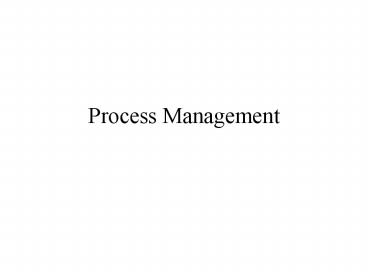Process Management - PowerPoint PPT Presentation
1 / 26
Title:
Process Management
Description:
Buys an existing car in the dealer's lot. Buying/Selling ... The New Business Model (Car Buying) Process Variability. Natural process variation ... – PowerPoint PPT presentation
Number of Views:35
Avg rating:3.0/5.0
Title: Process Management
1
Process Management
2
Process Definition
- What is a process?
- Inputs
- Raw material and other resources
- Information
- Specifications
- Outputs
- Products/services
- Output rate and format
- Flows
- Material, information, payments
- Rules
- How is the process performed?
- What conditions must hold?
3
Process Differentiation
- McDonalds processes
- Burger Kings processes
4
Burger King
SERVERS/ COUNTERS OPERATIONS
5
Broadly Defined Processes
IBM XEROX
Market Information Capture Market Selection Requirement Development of Hardware Development of Software Development of Services Production Customer Fulfillment Customer Relationship Customer Feedback Human Resources Marketing Financial Analysis Accounting IT Infrastructure Customer Engagement Inventory Management Logistics Product Maintenance Product Design and Engineering Technology Management Production Op. Management Market Management Supplier Management Information Management Financial Management Human Resource Management Capital Asset Management
6
Processes Implications (Job and Line)
- Delays in the system
- Inventory
- Worker skills and training
- Flexibility
- Automation
- Throughput
- Technology investment
- Response to contingencies
- Cost
7
Flows
- Flow of Material
- Inventory
- Component coordination
- Price Incentives
- Flow of Information (Business Processes)
- Information Format Inconsistency (EDI, Internet,
Intranet/Extranet) - Information Content
- Information Transparency
- Payments (Business Processes)
- Online payments
- Security
8
Processes Coordination
- Information mismatch
- Format, standards, device specificity
- Cost of coordination
- Compromises, delays, congestion, inventory, waste
- Cost of inflexibility
- Economy of scope
- Value and cost of standardization
9
Process Design
- Process Choice
- Job, line, project, continuous
- Throughput
- Quality of Output
- Integration
- Vertical, horizontal, outsourcing
- Flexibility
- Work-force, volume, equipment
- Customer, labor, or capital intensive
- Self-service, automation
10
Costs and Volume
Process 2 Special-purpose equipment
Break-even quantity
Total cost (dollars)
Process 1 General-purpose equipment
F2
F1
Units per year (Q)
11
Break Even Analysis
- Fixed cost F
- Variable cost C per unit
- Quantity produced Q
- Sales price p per unit
- Total cost F CQ
- Revenue PQ
12
Break-even Quantity
- Profit, P p Q (F CQ)
- Q
- Break-even ? P 0
- That is Q
- What if p decreases with Q?
13
Evaluating Two Processes
- Process subscripts n, m
- Cost Basis
- Process n is preferred to m if
- Fn CnQ lt Fm CmQ
- That is, Q (Cn ? Cm) lt Fm ? Fn
- Demand Q lt , if Cn gt Cm
- Demand Q gt , if Cn lt Cm
14
- Profit Basis
- Q (Pn ? Cn) ? Fn gt Q (Pm ? Cm) ? Fm
- Q (Pn ? Cn) ? (Pm ? Cm) gt Fn ? Fm
- That is, Q gt , if (Pn ? Cn) gt (Pm ? Cm)
- Q lt , if (Pn ? Cn) lt (Pm ? Cm)
15
BBC is deciding whether to weld bicycle frames
manually or to purchase a welding robot. If
welded manually, investment costs for equipment
are only 10,000. The per-unit cost of manually
welding a bicycle frame is 50.00 per frame. On
the other hand, a robot capable of performing the
same work costs 400,000. Robot operating costs
including support labor are 20.00 per frame. At
what volume would BBC be indifferent to these
alternative methods?
16
(No Transcript)
17
Volume and Process Decisions
Low Volume, make-to-order process
Project process
- Less vertical integration
- More resource flexibility
- More customer involvement
- Less capital intensity/automation
Process design choices
Job process
High Volume, make-to-stock process
- More vertical integration
- Less resource flexibility
- Less customer involvement
- More capital intensity/automation
Line process
Continuous process
18
Flow Chart
Service visible to customer
Service not visible to customer
Repair authorized
Parts available
Discuss needed work with customer
Customer drops off car
Mechanic makes diagnosis
Check parts availability
Perform work
Parts not available
Inspect/ test and repair
Order parts
Repair not authorized
Corrective work necessary
Repair complete
Customer departs with car
Perform corrected work
Collect payment
Notify customer
Points critical to the success of the service
Points at which failure is most often
experienced
19
New Business Processes
- Linking all inputs and outputs
- Modification of decision rules controlling flows
- Housekeeping modifications
- Flexibility to incorporate new processes
20
- New Components
- Catalog Personalization
- Product configuration
- Recommend Alternatives
- Express Order
- Talk to CSR
Authentication
Personal Greeting
Personal Catalog Pricing
Verify Order
Config Rules
Select Product
Compute Tax Ship
Express Order
Ship to Address
In Stock
Place Order
Shipping Option
Check Inventory
Recommend Alternatives
Talk to CSR
Out of Stock
21
Process Chart
22
Old Business Model
Process Reengineering (Car Buying)
Buying/Selling
Factory ships vehicles to dealers as forecast
(up to 8 weeks)
Vehicle awaits Buyers (up to
3 months)
Customer arrives at a dealership
Buys an existing car in the dealers lot
Waits for a matching vehicle (6 weeks)
Buys a car with a Different option package
Dealer obtains a car from another dealer
23
The New Business Model (Car Buying)
Customer orders online (minutes)
Order is transmitted
To Dealer (minutes)
To Factory (minutes)
Factory orders components (hours)
Dealer arranges Financing (one day)
Manufactured by Assembling Modules (Days)
Car shipped to Dealer (Few days)
Customer is informed
Dealer is informed
Customer visits Dealer to pick-up car
24
Process Variability
- Natural process variation
- Inherent fluctuations in the process
- Fluctuation around a basketball players long-run
percentage of free throws made - Special cause variation
- Caused by some problem or extraordinary
occurrence - A hand injury might cause the basketball player
to miss a larger than usual number of free
throws.
25
Process Control
26
Trends
Linear
Oscillatory































